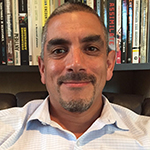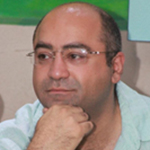UC San Diego Institute of Arts and Humanities Increases Its Cultural Breadth
Published Date
By:
- Cynthia Dillon
Share This:
Article Content
The University of California San Diego’s Institute of Arts and Humanities (IAH) is adding two programs to its already culturally rich offerings—Chicana/o and Latina/o Arts and Humanities (CLAH) and Third World Studies (TWS). Both are established campus programs now administered through the institute. CLAH provides a broad introduction to the histories and cultures produced by Spanish-speaking communities in the United States, while TWS analyzes and explains issues facing the “Third World” from a multi-disciplinary approach.

Director Luis Alvarez. Photo courtesy of UC San Diego Department of History
According to Associate Professor of History and CLAH Director Luis Alvarez, the creation of CLAH developed out of the long struggle by students and faculty to establish a home for Chicano Studies at UC San Diego, including the history of Chicano student activism that began with the major social movements in the 1960s and 1970s. These movements and the associated activism also influenced the establishment of the Department of Ethnic Studies on campus in 1990. By 2002, CLAH moved to the literature department where it offers a coordinated course of study drawing upon classes in theatre, ethnic studies, communication, history, literature and other departments.
“Students are the heart and soul of CLAH, and the program is a testament to how students always have been, remain and will be among the primary engines of positive change at UC San Diego when it comes to Chicana/o and Latina/o studies,” said Alvarez, an alumnus of the university.
Alvarez explained that the rising numbers of Chicana/o and Latina/o students at the university, plus the demographic revolution in California and the nation that is being driven in large part by Latina/o immigration, makes the CLAH program a vital campus resource for understanding the current state of our society, the longer past that has shaped how we’ve gotten to this point and where we might go in the future.

Artist, Mario Torero | original concept by M.E.Ch.A students | Digital Reproduction by Fernando Vossa
“One need only pay attention to the current election cycle to see how debates over immigration, the U.S.-Mexico border, racial tensions and related policy impact all of us,” he said.
CLAH approaches these important questions from a range of interdisciplinary perspectives, offering a thorough and generative introduction to the experience of Spanish-speaking communities in the U.S., including how they’ve long engaged one another, other racialized groups and the rest of the U.S. The program accomplishes this by including courses, topics and questions that are important for everyone to know something about.
“With census projections identifying 2042 as the year the United States will become a so-called ‘majority-minority’ nation, this is as true of our future doctors, scientists and engineers as it is of our history, English, and sociology majors,” said Alvarez. “CLAH helps train and educate students to know something about their own university and campus, as well as the communities they will work with and serve after they graduate.”
The Third World Studies program, the second new addition to the IAH, was established on campus in 1983 as an undergraduate offering to provide understanding of the Third World, the issues it faces and its relationship to the West with a multi-disciplinary approach. For example, students are required to take upper-division courses from at least three disciplines such as anthropology, sociology, political science and economics from the Division of Social Sciences, and literature and history from the Division of Arts and Humanities.
Further, TWS conceptualizes the emergence of the term “Third World” from a historical and political perspective. It also compares and contrasts developing nations to the West, while examining the historical context and current relationship between the two spheres. Additionally, TWS considers the shifting political and economic trends occurring in Third World countries.

TWS Director Babak Rahimi. Photo courtesy of UC San Diego Department of Literature
“Students gain an understanding of a deep divide between global south and north and structural economic and political inequalities around the world,” said TWS Director Babak Rahimi, professor in the Department of Literature, who said that his enthusiasm for the program hinges on the fact that UC San Diego has a program devoted to economic and political inequality in regions such as Africa, Asia and Latin America.
Rahimi added that TWS helps students develop a personal perspective of the Third World by encouraging travel abroad courses that can count toward the TWS major or minor.
The Institute of Arts and Humanities houses 12 other individual programs, encouraging conversations about the arts and humanities across borders of time, place, culture and discipline. It is committed to issues concerning social equity, diversity and inclusion; the hemispheric and global arts and humanities; public arts and humanities and digital arts and humanities. The institute is one of the resources offered by the Division of Arts and Humanities, which ranks in the top 35 nationally, according to U.S. News & World Report.
Share This:
You May Also Like
Engineers Take a Closer Look at How a Plant Virus Primes the Immune System to Fight Cancer
Technology & EngineeringStay in the Know
Keep up with all the latest from UC San Diego. Subscribe to the newsletter today.



